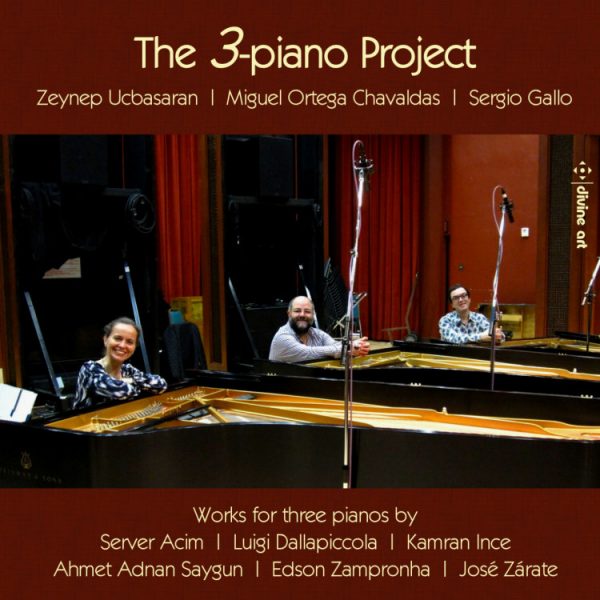Infodad
Miguel Ortega Chavaldas, Zeynep Ucbasaran and Sergio Gallo offer a recital whose audience will likely be somewhat limited by the nature of the repertoire – but certainly not by the very high quality of the playing. This CD bears the title “The 3-Piano Project,” and that designation helps explain the unusual material it offers: neither the works nor their composers (from Turkey, Brazil, Spain and Italy) will likely be well-known to most listeners.
The attraction here involves listening to a little-used instrumental combination, since “ensembles” of pianos are something of a rarity: with the exception of the 5 Browns, there are no well-known groups specializing in multiple-piano offerings. The paucity of three-piano compositions is of course part of the reason for this; and while several of the works on this CD are interesting enough, at least in part, none is sufficiently compelling to make it likely that three-piano groups will spring up as regular concert or recital features. The best-known composer here is Luigi Dallapiccola (1904-1975), whose fame rests on his serial compositions but who was doing some aural exploration even before he wholeheartedly embraced the Second Viennese School. Musica per tre pianoforti, also called Inni (“Hymn”), is one of Dallapiccola’s earlier pieces, dating to 1935, and it shows considerable command of writing for the piano. The first movement is comparatively straightforward, but the second, with its deep, grumbling opening, shows what can be accomplished in the three-piano vein, and the third, which opens with a single line and gradually layers on greater and greater sonic complexity, is a fascinating blend of lightness and chordal strength.
The other major piece on this disc is Poem by Ahmet Adnan Saygun (1907-1991), which here receives its world première recording. It is a pleasant enough work, well-constructed and attentive to the interactions among the three pianists, and it manages a degree of lyricism despite its use of sometimes-acerbic 20th-century compositional techniques. But it has a hesitant quality about it, as if not quite sure how poetic it wants to be, and it does not sustain especially well over its 15-minute length.
The remaining four works here are shorter and less ambitious. Fikir Hücreleri by Server Acim (1961-2019) stops and starts at irregular intervals and does indeed seem to be a series of “Idea Cells” rather than anything developed in any significant way. S’io esca vivo by Edson Zampronha (born 1963) is scalar and repetitive, its dissonances used to no particular purpose. Petit Nocturne Noir by José Zárate (born 1972) is suitably moody and dark, slow-paced and repeatedly fading to silence, the reasons for its need for three pianos being less than apparent. Requiem for Mehmet by Kamran Ince (born 1960) is, in contrast, big-boned and strongly scored, dramatically portentous from the start and quite determined to use the full sonic capabilities of the three instruments. Unfortunately, it never really goes anywhere: it keeps hinting that it will, that it is building up to something, but all that happens, eventually, is a kind of dissolution. The attraction of this disc lies in its concept (three pianos) and the quality of the performances (excellent), but much less so in the music itself. Except for Dallapiccola’s work, nothing here is gripping enough or sufficiently intriguing in its use of the pianos to make a listener wish for a great deal more three-piano material of the same kind.
[this review was linked to another on publication so the first sentence has been edited to make it flow correctly]
@divineartrecordingsgroup
A First Inversion Company
Registered Office:
176-178 Pontefract Road, Cudworth, Barnsley S72 8BE
+44 1226 596703
Fort Worth, TX 76110
+1.682.233.4978












